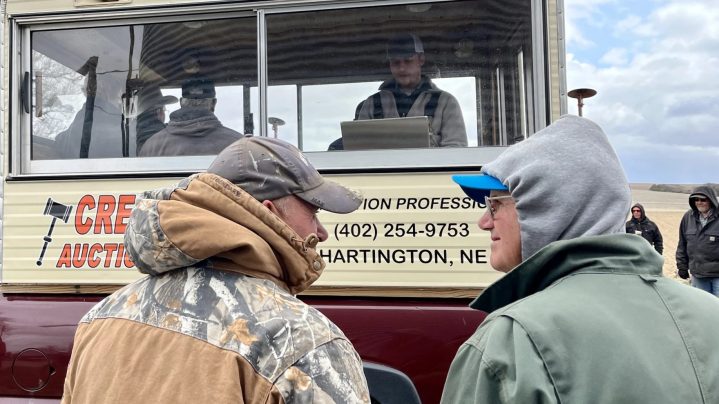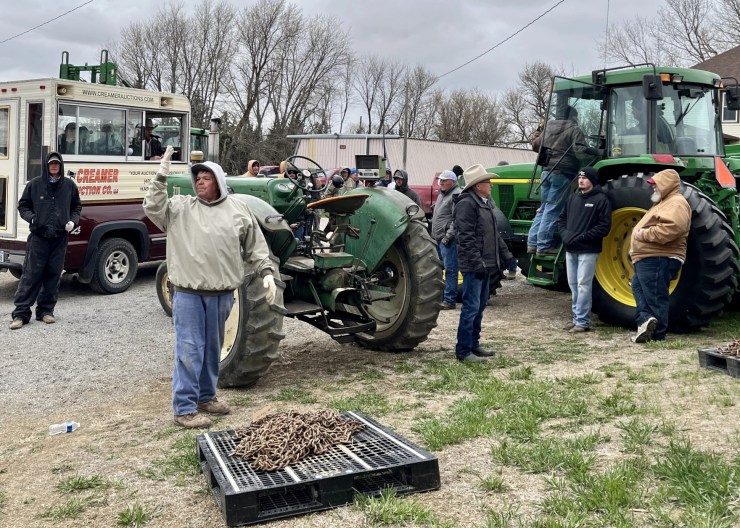
Going once, going twice, gone! Farm auctions are moving online, and that’s changing a rural tradition
Going once, going twice, gone! Farm auctions are moving online, and that’s changing a rural tradition

On a recent chilly spring day, tractors, four-wheelers, a truck and a skid-loader were neatly parked in rows outside a northeast Nebraska farmhouse.
The farmer who owns this equipment was retiring and holding an auction to sell the equipment to the highest bidders. About 200 people, including Anthony Thoene, crowded into a machinery shed to browse.

Thoene was hoping to get some fishing rods for his grandkids but was outbid. “Oh, now there’s the guy that got them,” he said with a laugh.
Many people in attendance knew each other and caught up over cups of coffee from the lunch stand. They strained to hear each other over the auctioneer’s requests for more bids as they discussed local politics and speculated about how much the tractors will go for.
For rural communities, auctions like these are often a social event to see neighbors and friends.
But it wasn’t just the bundled-up neighbors looking for a deal. Internet bidders were logging on from as far away as Montana to make an offer.
“There’s about 200 people here, but on the internet you’re talking thousands,” Thoene said. He occasionally helps Creamer Auction Company, the local business running this sale, set up their auctions. “So it definitely has improved the sales. But it’s harder to buy!”
Online transactions have become a big part of the auction business. The National Auctioneers Association estimates 70% of the industry’s $3 billion in sales come from the web.
It’s been a growing trend since eBay came on the scene in 1995, and then the pandemic cemented online sales, said Nancy Cripe, who runs Missouri-based GRS Auctions & Strategic Liquidation.
“Suddenly you couldn’t have a live auction,” she said. “You couldn’t have people into your place. And so auctioneers had to regroup.”
It’s also been good for business. Auctioneers say items go for as much as 50% more online than they do at purely in-person sales.
“A broader audience equals more competition,” Cripe said. “And the more competition you have for an item, the better the return.”
Websites also do better at attracting younger buyers, who might not be drawn in by an auction’s traditional setting or products.
Not Grandpa’s auction
Roy Montgomery has seen a lot of changes in the business over 40 years. He followed in his dad and grandpa’s footsteps to become a third-generation auctioneer. Now, he pretty much only does internet auctions through his company Montgomery Auction and Realty.
“I’ll be honest with ya, I haven’t had a live sale of my own in probably over three years,” Montgomery said. “Grandpa wouldn’t understand at all. He would just stop and shake his head, say, ‘I can’t believe how you’re doing that.’”
At Montgomery’s south-central Nebraska shop, shelves held hundreds of knick-knacks and antiques — like a tricycle with chipped red paint, a vintage Coca-Cola serving tray and a jewelry box.
He and his team photographed each item and entered a description into a portal for online buyers. Potential customers registered to bid from as far away as Las Vegas, North Carolina and Washington state for a recent online auction.

“Online auctions are like fishing in the ocean instead of fishing in a private pond. You’re getting money beyond the local base,” Montgomery said. “And some of this stuff in a live sale you probably couldn’t even get a dollar for it.”
But for many communities, auctions are more than just a business transaction. They’re a chance to check how things sell and see old friends.
Jim Schroeder came to the farm retirement sale in northeast Nebraska from his home about 15 miles away. He said a lot of times, it’s not really about what’s being sold.
“Retirement auctions are social,” he said. “It’s kind of like a retirement party. So a lot of friends will be here to say goodbye and stuff.”
Sometimes those social ties actually push buyers online. Auctions can be emotional — especially when it comes to selling land that’s been in a family for generations — and people may want to avoid in-person competition with their friends.
Schroeder’s nephew recently bought land and told him the highest bidders weren’t in the room.
“Some of the guys don’t want to be here, because they don’t want to be shown to be bidding against the neighbor,” he said. “They want to be anonymous.”
The ‘electricity’ of a live sale
Loren Beachy, president of Bright Star Auctions in Indiana, does a lot of hybrid events. Almost all his company’s auctions have internet bidders, in addition to a live crowd. About half of sales go to off-site buyers, he said.
And as an Amish man who often serves Amish customers, Beachy has even come up with a way to loop in folks who don’t use the internet, by creating a print catalog and mailing it to a list of Amish buyers.
“And then we set up a conference line where they can call in here and just verbally bid,” he said. “Amish online bidding, if you will.”
Beachy admitted, bidding via phone or computer will never quite capture an auction’s energy.
“There’s nothing like the excitement of a good brisk auction,” he said. “I’ve never been to a rock concert. But I know that there’s an element there of electricity and excitement.”
There’s a lot happening in the world. Through it all, Marketplace is here for you.
You rely on Marketplace to break down the world’s events and tell you how it affects you in a fact-based, approachable way. We rely on your financial support to keep making that possible.
Your donation today powers the independent journalism that you rely on. For just $5/month, you can help sustain Marketplace so we can keep reporting on the things that matter to you.













